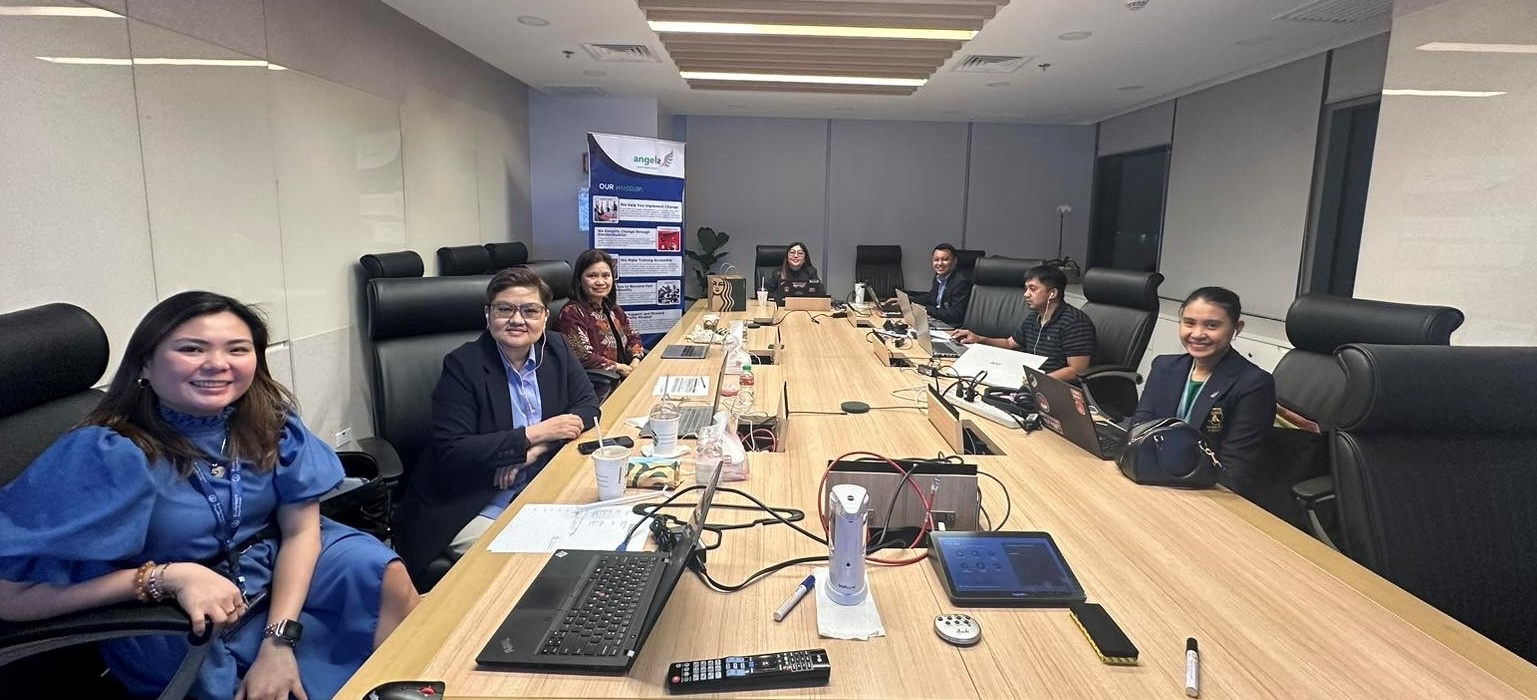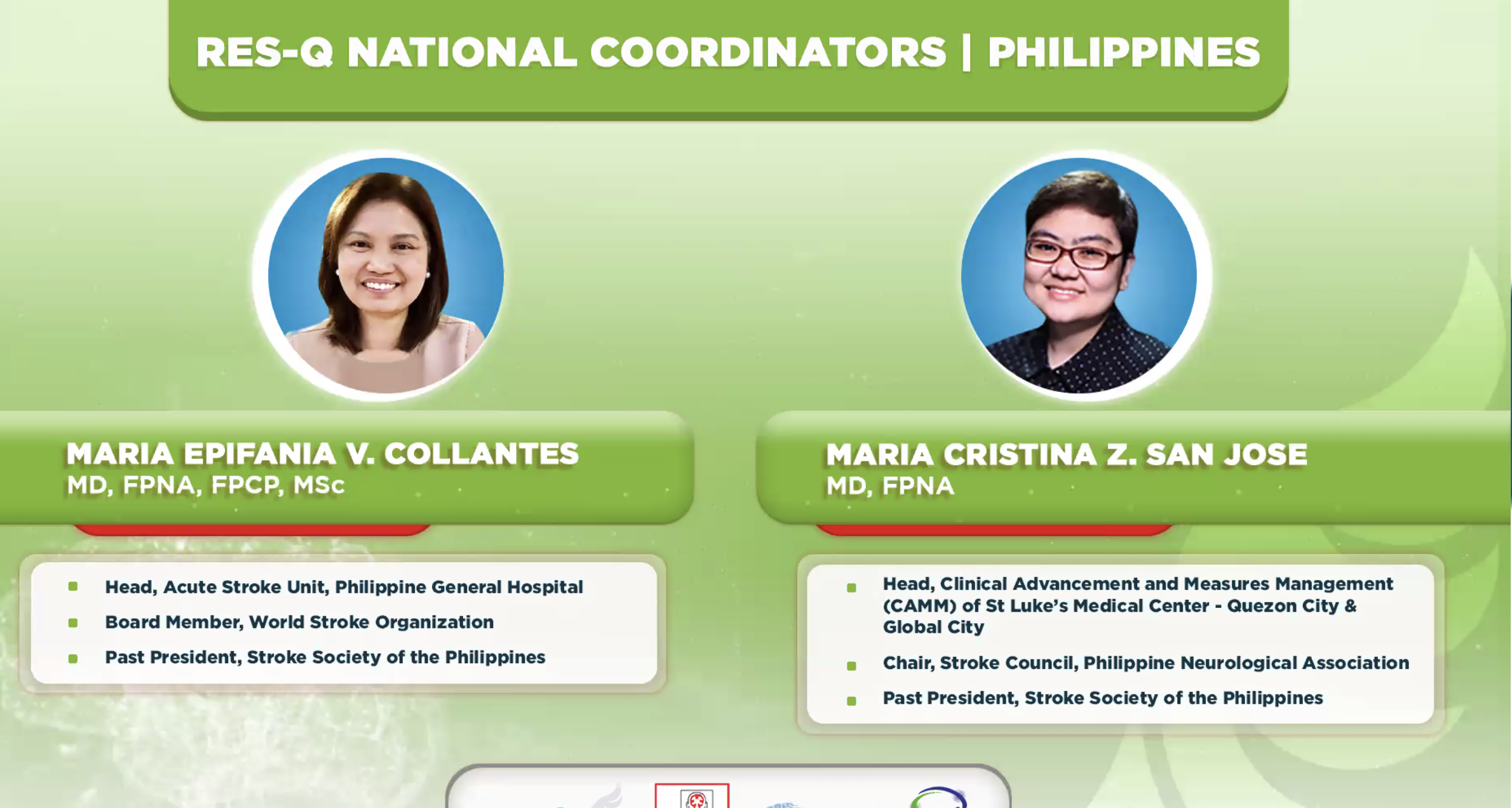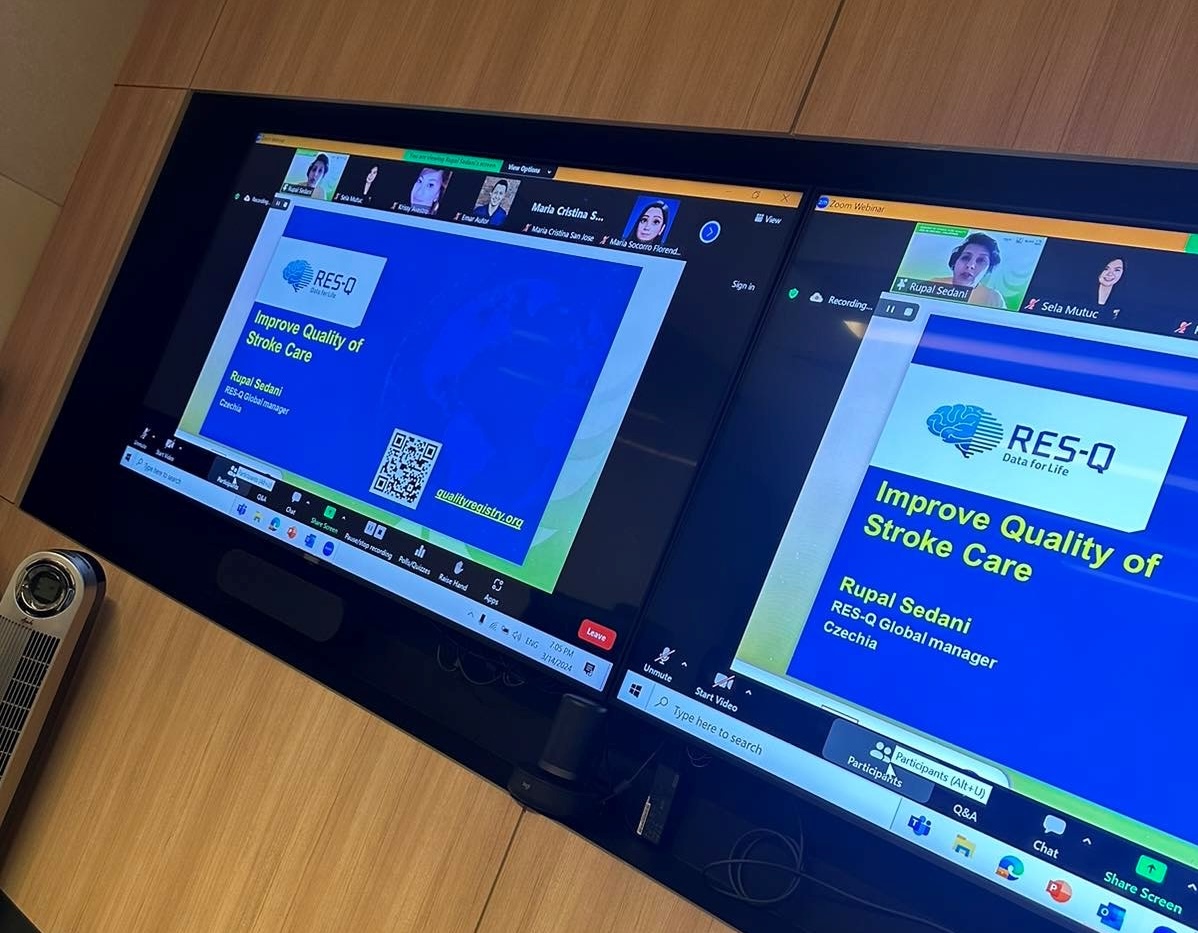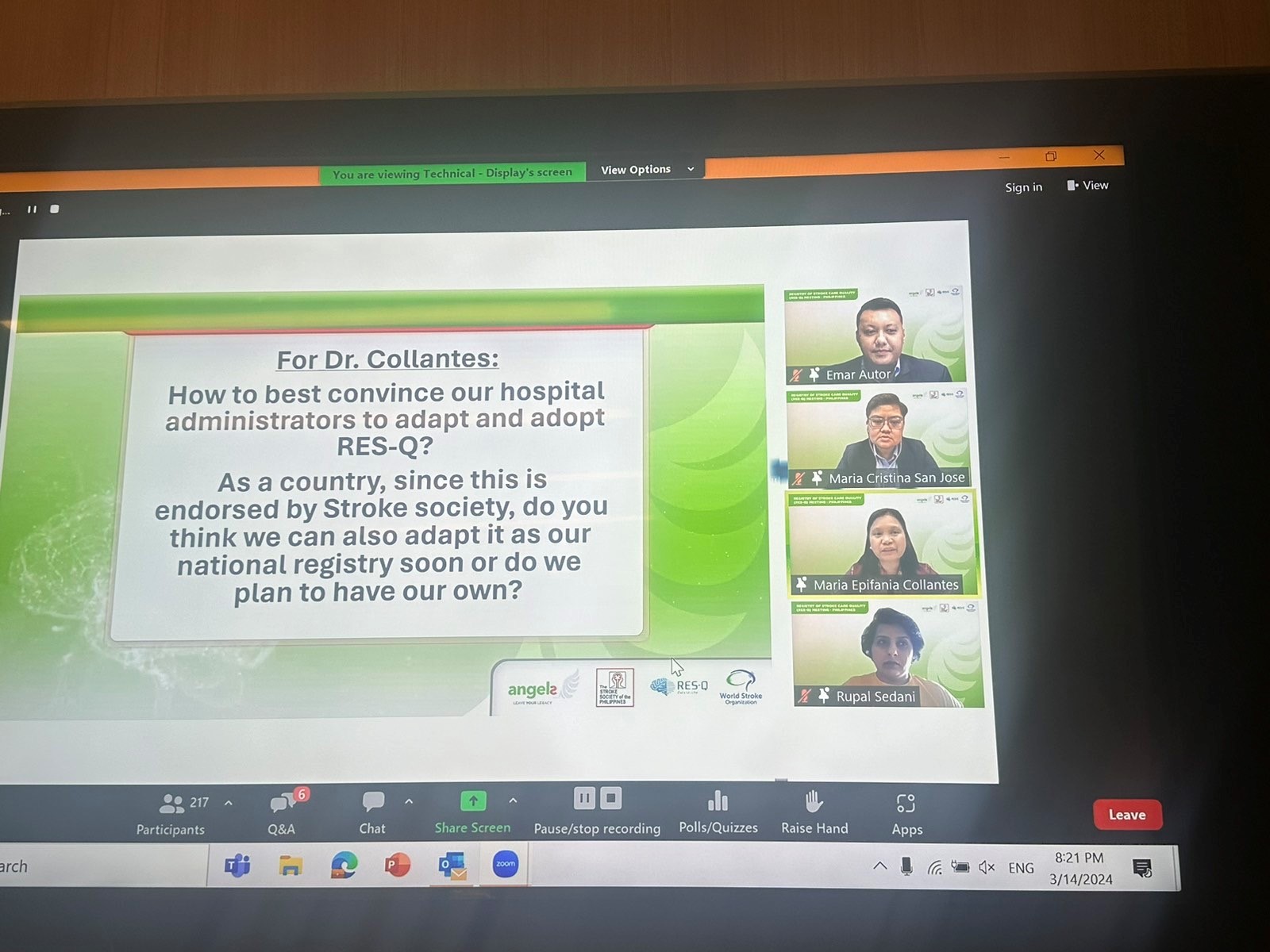
2024년 1월, 뇌졸중 품질 개선 레지스트리 RES-Q는 이야기가 있었습니다. 레지스트리는 새로운 웹사이트 주소로 새로운 미래 준비 플랫폼을 출시할 예정이었습니다. 새로운 플랫폼에는 이전 플랫폼에는 용량이 부족했던 몇 가지 매력적인 새로운 기능이 있었습니다. 여기에는 여러 계정에 액세스할 수 있는 단일 로그인 기능, 15개 언어로 제공되는 보다 직관적인 데이터 수집, 사용자 친화적인 대시보드, 온디맨드 보고서 생성 기능이 포함되었습니다.
글로벌 뇌졸중 커뮤니티에 새로운 URL을 알리고 이전 데이터의 마이그레이션이 새로운 사이트에 재등록되는 즉시 시작될 것임을 안심시키기 위한 캠페인이 시작되었습니다.
전 세계 Angels스 컨설턴트들이 자국의 병원들이 변화를 헤쳐나갈 수 있도록 돕기 위해 한 발짝 서게 되었지만, 필리핀 팀은 기회를 발견했습니다. 뇌졸중 치료 인증 병원이 RES-Q를 사용하는 방법과 그 이유에 대한 실습 교육을 받은 마닐라에서의 이정표 회의 이후 약 8개월이 지났습니다.뇌졸중

품질 모니터링은 필리핀 뇌졸중학회(Stroke Society of the Philippines, SSP)가 2023년 초에 개시한 급성 뇌졸중 준비 병원(ASRH) 인증 프로그램의 요건입니다. Manilla 회의의 목표는 데이터 수집 프로세스에 대한 인식을 바꾸는 것이었습니다. ASRH 인증 병원 47곳의 뇌졸중 치료 전문가들을 한 번의 행사에서 한데 모으는 것이 이 두 병원의 성공이었습니다.
이제 “새로운” RES-Q가 출시되면서 품질 모니터링 중심의 모임을 위한 또 다른 기회가 주어졌습니다. 이번에는 더 많은 병원에 가기 위해 온라인으로 개최되었습니다.
3월 14일 저녁에 개최된 웨비나는 75개 병원을 대표하는 300명 이상의 참가자의 참석을 유도했으며, 다시 한 번 Angels SSP 간의 시너지 효과를 입증했습니다. 이 회의는 현재 RES-Q의 국가 코디네이터 역할인 Maria Epifania Collantes 박사와 Maria Cristina San Jose의 역할을 공유하는 두 명의 과거 SSP 사장이 진행했으며, 현재 SSP 사장인 Maria Socorro Sarfati 박사의 마무리 진술이 있었습니다. 주요 행사는 체코 공화국에서 연결하는 RES-Q 글로벌 관리자 Rupal Sedani가 수행하는 새로운 RES-Q 플랫폼의 가상 워크스루였습니다.

품질 모니터링 수행하는 이유
국가 레지스트리로 RES-Q를 채택하는 것은 처음부터 뇌졸중 치료를 개선할 수 있는 기회였다고 Dr Collantes는 말했습니다. 데이터 수집 및 분석은 환자 치료 시점과 정책 변경 측면에서 이익을 가져왔다. 품질 모니터링은 병원 수준에서 격차와 도전을 식별하는 것뿐만 아니라 위험 요인에 대한 데이터를 제공하고 성별 차이, 사회경제적 및 지역적 차이와 같은 문제에 집중함으로써 정책에 영향을 미칠 수 있습니다. 이는 치료 지연의 원인을 밝혀내고, 뇌졸중 일정과 결과를 개선하며, 추세를 도표화하고, 궁극적으로 사망률을 감소시키는 데 도움이 될 수 있습니다.
그러나 데이터가 완전하고 정확한하여 전국에서 뇌졸중 치료에 대한 명확한 그림을 얻을 필요가 있었습니다.

RES-Q를 사용하는 것은 필리핀에서 증거 기반 의료 및 품질 개선의 주요 조력자였다고 San Jose 박사는 말했습니다. 품질 모니터링은 증거 기반 의료를 촉진하고 포함시키기 위한 주요 전략 중 하나였으며, 이는 전체 의료 서비스 제공 시스템이 증거 기반 원칙에 기반하도록 보장하는 것을 의미합니다.
품질 모니터링은 명시적 기준에 대한 치료 체계적인 검토를 가능하게 했다고 San Jose 박사는 말했습니다. 데이터는 문제를 식별하고 분석하는 데 도움을 주어 품질 개선을 추진하고 끌어올렸습니다. 입수한 정보는 의사 결정의 기초였으며 의사 결정이 행동으로 이어졌습니다.
또한 데이터 수집을 통해 벤치마킹을 할 수 있었으며, 경쟁사 및 업계 리더의 결과와 프로세스를 비교함으로써 더 나은 결과를 얻기 위한 추진력이 촉진되었습니다.

습관으로 만들기
질문 시간은 향상된 사용자 친화적인 RES-Q 플랫폼의 가상 투어를 통해 추가 통찰력을 얻었습니다.
문: 병원 관리자가 RES-Q를 채택하도록 설득하려면 어떻게 해야 합니까?
Dr Collantes: 그들에게 그 이점에 대해 이야기하고 뇌졸중 치료를 개선하기 위해 데이터를 어떻게 사용할 수 있는지 보여주십시오.
문: 필리핀에는 자체 레지스트리소가 있습니까?
Dr Collantes: RES-Q는 전국 뇌졸중 레지스트리입니다. 이는 국제적으로 인정받고 있으며 개선을 가능하게 하는 실시간 피드백을 제공합니다.
문: 우리 병원에서 누가 RES-Q를 담당해야 합니까?
San Jose 박사: 품질 개선을 위해 데이터를 사용하는 데 전념하는 변화 챔피언을 식별합니다.
문: 귀하의 부서 또는 병원에서 품질 모니터링 결과를 보고하고 전달하기 위한 모범 사례는 무엇입니까?
이 질문에 대한 답변은 지속적인 품질 개선과 환자를 위한 더 나은 결과를 약속하는 것이 의미하는 바의 핵심이었습니다. 네 마디 말만 해도, 병원에 입원하면 이 웨비나를 포함하여 품질 모니터링 활성화가 달성하려는 모든 것을 달성할 수 있다는 조언이 포함되어 있었습니다.
San Jose 박사는 잠시 주저하지 않았습니다. 그녀는 “생활 습관을 들이세요”라고 말했습니다.


